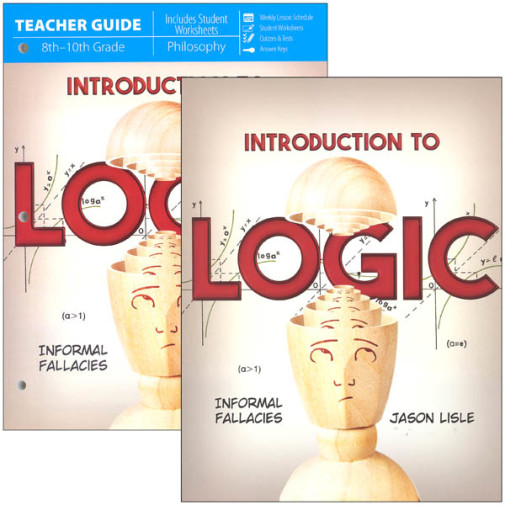We use cookies to make your experience better. To comply with the new e-Privacy directive, we need to ask for your consent to set the cookies. Learn more.
Introduction to Logic Curriculum Pack
This set includes the Introduction to Logic Student Book and Teacher Guide.
Welcome to the world of logic. This logic course will both challenge and inspire high school students to be able to defend their faith against atheists and skeptics alike.
Because learning logical terms and principles is often like learning a foreign language, the course has been developed to help students of logic learn the practical understanding of logical arguments. To make the course content easier to grasp, the schedule provides worksheets and practice sheets to help students better recognize logical fallacies, as well as review weeks for the quizzes and the final. The practice sheets in the back of the book offer practical study for both the final exam and for actual arguments you might encounter online or in the media. The practice sheets used in review before the end of the course come from all of the chapters and help students prepare for the final exam.
Another way to help understand and memorize new terms is by creating flash cards or memorization cards. It should be noted that this is a part of nearly every week of study on the schedule provided. As new concepts are added each week, it is suggested that this review time grow to allow review of older concepts and the addition of the new terms. Students can make their own flashcards on 3 x 5 cards (the term on one side and the definition on the other), or they might find a flashcard app that can be used from a phone or computer.
Logic is the study of the way God thinks. So, by studying logic, you are actually doing theology! This is a great point to emphasize for students who fancy themselves theologians, but are not terribly excited about logic. Students planning on going into ministry better learn something about the mind of the God they serve. Students of science better learn something about God's mind since it is God's mind that controls every atom in the universe. Knowing how their Creator thinks will give them an edge over secular students. Emphasize how awesome it is that we are learning about God's mind! It would be wonderful to learn how Leonardo da Vinci's mind worked, or Albert Einstein's. How much more awesome to learn about the mind of God!
Studies have shown that students learn far more effectively and retain information better if they are exposed to it in short bursts over a long period of time rather than in a long burst of short duration. The student who studies a topic for 40 hours in one week will not retain it nearly as well in longterm memory as a student who studies for a total of 40 hours spread out over two months. For this reason, it is helpful to occasionally ask the student to recall information learned in previous chapters. This reinforces the topic, helps with memorization, and may help the student to think about the older material in light of the newer material. For these reasons and more, we stop and review fallacies covered in previous chapters.
Written by a Christian astrophysicist, this course is a philosophical and Biblical approach to logic, emphasizing informal fallacies. Rather than focusing on structuring an argument, this course focuses on the principles of correct reasoning. Written to the student, the Student Text grounds itself with the belief that there is a Biblical rationale to studying, that to think logically is to think like God, and that faith and reason go hand in hand. The book's first half builds a solid foundation by defining logic, then touches on key logic concepts, and then finally teaches 35 informal fallacies, divided by type: presumption, ambiguity, and relevance. Assignments include worksheets, assessments, and learning vocabulary using index cards. The student text highlights and defines each chapter's key terms. The consumable Teacher Guide includes a weekly schedule with space for recording, student worksheets, quiz and test answer keys. Reproducible for family use. Solid individually or as a set. A solid logic overview course rooted in Biblical foundations.
| Product Format: | Other |
|---|---|
| Brand: | Master Book Publishers |
| Grades: | 8-10 |
| ISBN: | 9781683441595 |
| Length in Inches: | 11 |
| Width in Inches: | 8.375 |
| Height in Inches: | 0.875 |
| Weight in Pounds: | 2.05 |

